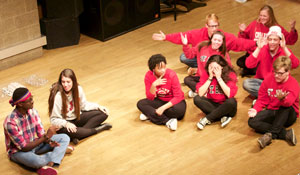Students create reflection, action, dialogue
December 12, 2016
Maria Knudsen '17
Sometimes, it takes distance to see things from a new perspective.
This was the case for a group of 16 students from the College of Saint Benedict and Saint John's University who studied abroad on CSB/SJU's program in Guatemala during spring semester 2016.
While in Guatemala, they participated in a course centered around an interactive performance style known as Theatre of the Oppressed, that challenges participants to shape the outcome of the production through conversation and engagement.
CSB and SJU students were asked to choose a theme and explore it with their performance. The students identified racial and cultural tensions at CSB and SJU, and through the production, students sought to explore those issues and create a forum for safe dialogue.
After performing in Guatemala, students were inspired to bring their work back for two performances in October in Alumnae Hall at CSB and Brother Willie's Pub at SJU.
Theatre of the Oppressed
"Forum theater consists of a short performance piece followed by a dialogue where the audience is invited to analyze the story that they have seen and try to come to an agreement on what the question is that is embedded in the story," said Roy Ketchum, associate professor of Hispanic studies at CSB and SJU. Ketchum served as director of the Guatemala study abroad group.
Students focused their performance on themes underlying events surrounding the 2014 iteration of a series of student parties that have become a campus tradition each spring. That year, several of the off-campus parties carried racially charged and culturally insensitive themes that sparked protests and, ultimately, discussions about discrimination and cultural appropriation at CSB and SJU.
"We are all very different people from different places and different backgrounds, but we all just agreed that the events from FAMSAK 2014 were the most important to us," said SJU senior Jacob Shawback.
RAD returns to campus
The group now calls itself RAD: Reflection. Action. Dialogue., terms which exemplify three critical functions of Theatre of the Oppressed.
Performances depicted real experiences in the lives of members of the CSB/SJU community, aiming to shed light on overt and subtle forms of exclusion on campus and beyond.
They included a portrayal of FAMSAK events from 2014. A discussion between the performers and audience followed with all trying to find ways the situations could have been handled differently. This opened up improv opportunities for spectators to participate in rewriting — and performing in — the story.
As performances continued, audience members wrote down recommendations on ways in which CSB/SJU and its administration could improve cultural inclusivity on campus. These recommendations were collected and discussed within a pre-selected group of campus leaders, professors and administrators. This group then chose a handful of top recommendations and presented them to the larger audience who then voted on whether to endorse each idea or not.
Ideas that were endorsed at the events include things like required cultural training for faculty and administration, making RAD part of the orientation schedule and expanding ally groups on campus.
What's next
Among the recommendations supported by audiences were more programs and events from the RAD group. The group has recently established itself as an official campus organization under the Center for Global Education, which allows it to function as a reoccurring program and gives them the flexibility to continue to integrate RAD into the campus community.
"Among the students who brought RAD to campus, on their own terms, they're working on articulating what it means for RAD to continue to have a presence on campus," Ketchum said.
In the near future, the group hopes that integration will take the form of faculty development workshops, additional performances and campus conversations.



